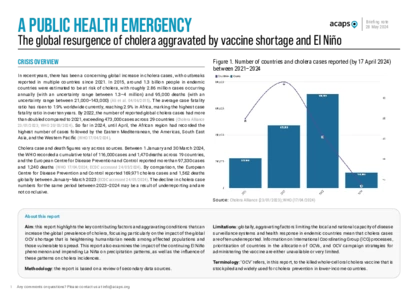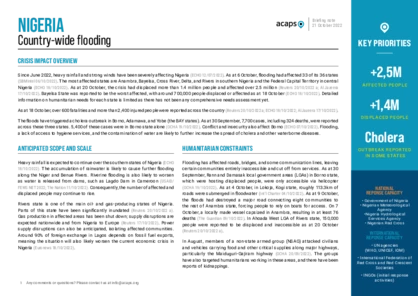Latest updates on country situation
24 November 2025
Two major abductions in mid-November 2025 underscore deteriorating security in North Central and North West Nigeria. On 17 November, armed attackers abducted 25 schoolgirls from a boarding facility in Kebbi state. Five days later, gunmen seized approximately 315 students and 12 staff from St Mary's Catholic School in Niger state – one of the largest abductions in recent years. Both incidents occurred in remote areas with limited state presence, reflecting organised armed groups' expanding territorial reach across North Central and North West Nigeria. These abductions have severely disrupted education access. Authorities in affected states have temporarily closed schools as a precautionary measure, affecting thousands of learners adding to others already facing the closure of 589 other schools nationwide from insecurity. Rising violence continues to undermine children's safe access to education and erode confidence in state protection. (ECHO 18/11/2025, CNN 21/11/2025, PI 18/11/2025)
23 September 2025
The 2025 lean season (May–October) in northern Nigeria has been the harshest in recent years, compounding existing pressures. Around 1.2 million displaced people face heightened risks as food shortages, flooding, and constrained assistance drive hunger, malnutrition, and potentially harmful coping strategies. Women and children are disproportionately affected, with notable increases in child marriage, child labour, and gender-based violence. Over 72,000 people have lost vital civil documentation, while rising evictions linked to unpaid rent erode already fragile livelihoods. Searching for food, water, and fuel has exposed families to abductions and attacks. Explosive ordnance incidents have nearly doubled over the past two years, with more than half of casualties recorded since May. Cross-border movement has emerged in Adamawa, with Nigerians searching for food in Cameroon. Adamawa, Borno, Katsina, Sokoto, Yobe, and Zamfara states remain the epicentres of protection concerns, particularly in ten Local Government Areas facing the most acute crises. (UNHCR 18/09/2025, FEWS NET 29/08/2025)
09 September 2025
On 5 September 2025, a suspected Boko Haram group attacked Darajamal village, Borno state, targeting a recently resettled community. At least 60 people were killed, 28 houses burnt, and nearly 500 people displaced. The assault destroyed newly built housing units meant to host 3,000 displaced people returning from Bama town’s IDP camp. The attack highlights how persistent insecurity continues to jeopardise durable solutions for displaced people. (AJ 06/09/2025, DW 06/09/2025, ECHO 08/09/2025)
02 September 2025
Floods during the 2025 lean season (June–August) affected 64,649 people in Borno, Adamawa, and Yobe, displacing 13,847, killing 53, injuring 354, and causing widespread shelter losses. The floods submerged farmlands spanning 8,716 hectares, undermining food security. The worst-hit local government areas were Damboa, Potiskum, and Yola South, resulting in urgent needs for shelter, food, and health. (OCHA 02/09/2025, OCHA 29/07/2025, ECHO 28/07/2025)
22 July 2025
Malnutrition is rising sharply across Borno, Adamawa, and Yobe states as the 2025 lean season deepens existing vulnerabilities. Around 4.6 million people are projected to face acute food insecurity between June–September, with over 600,000 children under five at immediate risk of severe acute malnutrition (its most life-threatening form). Health facilities are reporting a surge in admissions, with one International Rescue Committee clinic registering a 178% increase in inpatient cases between March–May. Drivers involve a combination of factors, including depleted household food stocks, soaring food prices, inflation, currency depreciation, conflict-related displacement, and significant humanitarian funding cuts. Risks of seasonal diseases, including malaria and pneumonia, and waterborne diseases such as cholera, especially among children, significantly worsen the situation. Humanitarian access remains constrained in conflict-affected areas, limiting scale-up efforts. In April, the Government declared a state of emergency on food security, highlighting the severity and national scope of the crisis. (IRC 07/07/2025, IFRC 07/07/2025, OCHA 10/07/2025)
22 July 2025
On 18 July 2025, bandits attacked the Kairu community in Zamfara state, killing six and abducting over 100 people. The two-hour raid triggered mass displacement, with thousands fleeing. Zamfara remains a hotspot for armed violence, with frequent kidnappings and attacks disrupting livelihoods, farming, and safe movement across the region. (Reuters 18/07/2025, AJ 19/07/2025)
17 June 2025
Between 13–14 June 2025, armed herders attacked Yelewata in Guma local government area, Benue state, killing over 200 people and triggering the widespread displacement of over 6,500 individuals, including 3,000 relocated to the newly established Ultra Modern Market IDP Camp in Makurdi. The incident is part of a broader trend of violence in the region and has heightened insecurity in surrounding communities, prompting secondary displacement. The destruction of homes, food stores, and market infrastructure has severely affected people’s livelihoods. Priority needs include emergency shelter, food assistance, healthcare, clean water, and adequate sanitation. Psychosocial support is also critical, particularly for the 408 displaced children. Violence in Benue and neighbouring Plateau state, where over 100 people have been killed since April, continues to undermine stability. The growing displaced population is straining host communities and humanitarian response capacity. (UNICEF 17/06/2025, HumAngle 17/06/2025, AP 14/06/2025)
current crises
in
Nigeria
These crises have been identified through the INFORM Severity Index, a tool for measuring and comparing the severity of humanitarian crises globally.
NGA009 - Multiple Crises
Last updated 31/01/2026
Drivers
Conflict/ Violence
Floods
International Displacement
Political/economic crisis
Crisis level
Country
Severity level
4.1 Very High
Access constraints
4.0
NGA010 - Conflict in North Central
Last updated 31/01/2026
Drivers
Conflict/ Violence
Crisis level
Country
Severity level
3.6 High
Access constraints
2.0
NGA008 - Displacement from Cameroon
Last updated 31/01/2026
Drivers
International Displacement
Crisis level
Country
Severity level
2.2 Medium
Access constraints
1.0
NGA007 - Conflict in the North West
Last updated 31/01/2026
Drivers
Conflict/ Violence
Crisis level
Country
Severity level
3.7 High
Access constraints
2.0
NGA004 - Conflict in the BAY states
Last updated 31/01/2026
Drivers
Conflict/ Violence
Crisis level
Country
Severity level
4.2 Very High
Access constraints
4.0
Analysis products
on
Nigeria
18 November 2025
Nigeria: conflict dynamics and humanitarian implications in North East, North West, and North Central
DOCUMENT / PDF / 1 MB
This report provides an analytical overview of the escalating, complex, and interlinked violence occurring across Nigeria’s North East, North West, and North Central geopolitical zones.
24 September 2024
Nigeria: humanitarian impact of floods in Borno state
DOCUMENT / PDF / 743 KB
On 9 September 2024, heavy rain and structural damage caused the Alau Dam in Konduga local government area (LGA), Borno state, to collapse. The dam collapse caused flash flooding in neighbouring Maiduguri and Jere LGAs.
28 May 2024
Global increase of cholera: aggravated by vaccine shortage and El Niño
DOCUMENT / PDF / 341 KB
This report highlights the key contributing factors and aggravating conditions that can increase the global prevalence of cholera, focusing particularly on the impact of the global OCV shortage that is heightening humanitarian needs among affected populations and those vulnerable to spread.
Attached resources
03 January 2024
Nigeria: conflict in the northeast and northwest
DOCUMENT / PDF / 201 KB
Violent incidents reported include attacks, kidnapping, and extortion by non-state armed groups (NSAGs), such as Boko Haram and the Islamic State – West Africa Province (ISWAP), as well as militias known locally as bandits.
21 October 2022
Nigeria: country-wide flooding
DOCUMENT / PDF / 1 MB
Since June 2022, heavy rainfall and strong winds have been severely affecting Nigeria. As at 6 October, flooding had affected 33 of its 36 states. As at 20 October, the crisis had displaced more than 1.4 million people and affected over 2.5 million. The floods have triggered a cholera outbreak in Borno, Adamawa, and Yobe.






